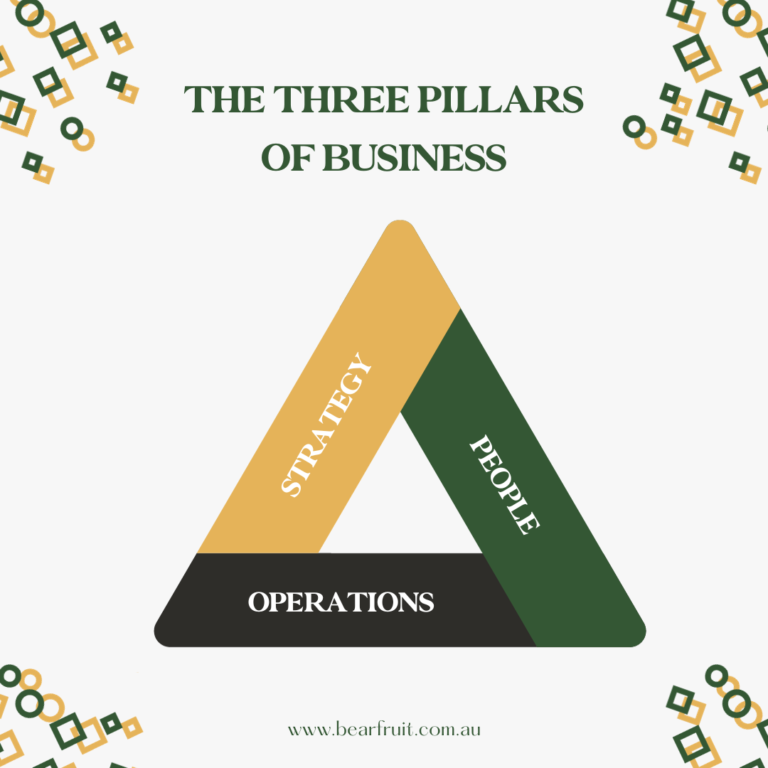Balancing the three pillars for business success

Managing your organisation can be a juggling act between business growth and putting out (metaphorical) fires. However, small businesses and not-for-profit organisations don’t have the luxury of large budgets and vast reservoirs of knowledge that larger companies possess. The good news is, we have created a model to categorise and manage three areas, strategy, people and operations, that underpin every successful organisation.
At Bearfruit, we understand that achieving balance in these three core pillars of business is essential for your success. We’re here to guide you through this journey. You can skip to the end of this article for a summary of how these pillars evolve across various stages of the business lifecycle.
Strategy: what your business does
Think of your business strategy as what your organisation is trying to achieve. It’s the heart of your business. Your vision and mission are the why behind your business’s existence, and your strategy is the roadmap that brings it all to life. Without a clear strategy, it’s like hiking in the bush without a map – you tend to get lost.
Why is strategy important for your business?
Without a clear ‘what’ to do, chaos reigns in your organisation. Decisions become haphazard, and your services and products no longer align with the original purpose. Not to mention, team members get frustrated when they lack a shared sense of direction.
How do you create a successful strategy?
A robust business strategy encompasses three key aspects:
- A substantial timeframe – we recommend five-year plans
- Measurable Objectives, so you know exactly how the business is tracking
- The plan must filter into operational plans that detail who is responsible for achieving the objectives and how that will happen.
People: who does things in your business
Your people are your most valuable asset. They’re the ones who bring your products or services to life and keep the organisation running. Oh, and don’t forget – business owners and leadership are a fundamental part of this too! In keeping with our hiking analogy, your people are the hikers while your leaders are those who organise who’s reading the map, bringing the snacks and ensuring there is a first aid kit.
Why are people crucial for your business?
Whether you’re in the business of creating products or providing services, your team is the heartbeat of your organisation. Without them, your business would come to a standstill.
And let’s not forget, if you’re a business owner or leader, you need support too! Whether that’s leadership mindset coaching, communication mentoring, or HR support, being clear about your own needs will help your team do what they do best.
How do you establish a successful team?
You can attract and engage a successful team of people to be part of your business by:
- Ensuring their values aligned with the values of your organisation
- Clearly communicating how each team member’s role supports your vision and strategy
- Defining distinct responsibilities and accountabilities for each person
- Using a variety of HR strategies to maintain long-term motivation
- Fostering a workplace culture that aligns with the type of business you want to run
- Establishing strong leadership within your company
Operations – how your business runs
Operations encompass the activities, materials, policies, and supports that are how your organisation functions. Regardless of whether your organisation produces products, services, or both, the same essential tasks and activities underpin your operations. For a hike in the bush, your operations would include your map, compass and walking shoes, to name a few.
Why are robust operations important for your business?
Operations ensure your products or services are made and delivered effectively, quickly, and maintain good quality. Without well-defined operations for ‘how’ your organisation will produce and support its goods and services, quality may suffer, and costs and production time will increase.
How do you ensure successful operations?
Efficient and effective operations occur:
- Policies, processes and procedures are clearly defined and easily accessed
- Operations are adaptable and can adapt to internal and environmental changes
- Regular audits ensure that quality and effectiveness are maintained or improved
A summary of the three business pillars
Balancing the three pillars – strategy, people, and operations – is essential for your organisation’s success. It might feel challenging, but with the right approach and commitment, you’ll be well on your way to achieving your business goals. A recap of how these pillars are balanced across different stages of the business lifecycle is pictured below.
We understand the unique challenges facing small businesses and not-for-profits today. As seasoned business professionals, we’re here to provide the guidance and expertise you need. So, let’s chat and set your business on a course for success! Contact us today to schedule a consultation.
Want monthly emails that improve your strategy, people and operations?
Thank you!
You have successfully joined the Bearfruit mailing list and will only receive high-quality content every few weeks - no spam!

